| Srl | Item |
| 1 |
ID:
167923
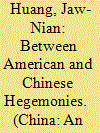

|
|
|
|
|
| Summary/Abstract |
This article provides an international-political-economy explanation of the development and degradation of Taiwan's press freedom from 1988 to 2016. It argues that Taiwan tends to have more press freedom when it depends economically on a liberal hegemon (such as the United States) and less press freedom when it depends upon a repressive hegemon (such as China). The underlying mechanism is norm diffusion in which local state–business elites introduce media norms from the hegemon and institutionalise them in Taiwan. The Taiwan case implies that transnational economic linkages do not always bring about domestic improvements in human rights, but may damage them when relations of economic interdependence involve powerful authoritarian countries, and that norms may diffuse not only from liberal contexts to repressive states, but also from powerful authoritarian countries to weaker liberal countries.
|
|
|
|
|
|
|
|
|
|
|
|
|
|
|
|
| 2 |
ID:
154727
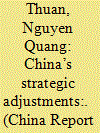

|
|
|
|
|
| Summary/Abstract |
After the eighteenth Congress of the Chinese Communist Party, China adjusted its diplomatic strategy and
transformed its pattern of economic development. This has had and will continue to have both a positive
and a negative impact on the international financial institutions and the regional and global economy.
The ‘One Belt, One Road’ (OBOR) strategy, combined with the Asian Infrastructure Investment Bank
(AIIB) and the internationalisation of the yuan, is the main focus, and exerts a strong impact on the
existing international financial institutions as well as the economic relations between China and many
other countries in the world. It has attracted many developed and developing countries to join the AIIB.
It also has made many emerging economies become closely linked to China. Moreover, it contributes to
the emergence of many ‘asymmetric’ pairs of economic relations between China and its neighbours. China
is now connected with Europe through an overland route as well as through the boosting of economic,
trade and investment ties between Asia and Europe. Furthermore, while Europe has been concerned
about China’s unfair competition and the dependence on Chinese investment, ASEAN has increasingly
deepened the mutual economic dependence between itself and Beijing. A negative outcome of this is the
rising economic dependence on China of quite a few ASEAN member states, including Vietnam.
|
|
|
|
|
|
|
|
|
|
|
|
|
|
|
|
| 3 |
ID:
139781
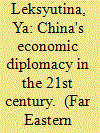

|
|
|
|
|
| Summary/Abstract |
The author takes on China's economic diplomacy, a key area of that country's foreign policy in the 21st century that includes economic rewards and coercion. She addresses, in particular, the measures Beijing is taking to make other countries heavily dependent on China. The author also discusses the significance of aid China offers in an effort to advance its foreign policy goals.
|
|
|
|
|
|
|
|
|
|
|
|
|
|
|
|
| 4 |
ID:
129383
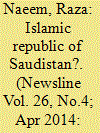

|
|
|
| 5 |
ID:
129342
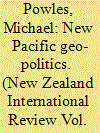

|
|
|
| 6 |
ID:
140277


|
|
|
|
|
| Summary/Abstract |
The existing literature on foreign policy formulation suggests that individual leaders in small and politically unstable states exert a disproportionate impact on foreign policy-making. Some analysts further contend that personalized foreign policy decision-making is more likely to suffer from discontinuities. This article, however, argues that the foreign policies of small and politically unstable states exhibit considerable variation in terms of constancy. It does so by offering a comparative study of the foreign policies of the Philippines and Thailand towards China. It demonstrates that the Philippines’ policy towards China underwent significant changes in the last few years of the administration of President Gloria Macapagal Arroyo, and that bilateral relations deteriorated rapidly after Benigno Aquino III came to power in 2010. In contrast, Thailand has maintained a cordial relationship with China despite domestic political turmoil since 2006. This article suggests that neither the shift in the distribution of capabilities nor the presence or absence of territorial disputes sufficiently explains this variation. It argues that the personalization of foreign policy and economic dependence are two important factors that determine constancy and change in the foreign policies of small states towards major powers.
|
|
|
|
|
|
|
|
|
|
|
|
|
|
|
|
| 7 |
ID:
163427


|
|
|
|
|
| Summary/Abstract |
A key feature of Asia’s evolving strategic landscape is U.S. efforts to promote policy coordination and interoperability among its allies and partners, through dialogues, exercises, intelligence-sharing agreements, and other means. Though useful in addressing practical issues and underscoring shared values, a concern is that these ‘minilateral’ activities could exacerbate Chinese fears of ‘encirclement’ and lead to strategic or economic counter-moves. However, this article suggests that a new ‘security dilemma’ in Asia is not likely. Although Chinese officials and analysts are apprehensive about U.S. bilateral alliance developments, they have largely discounted the emergence of an ‘Asian NATO’ under U.S. stewardship. This is due to perceived divergences between U.S. allies, many states’ economic dependence on China, and U.S. self-restraint. This should open possibilities for greater minilateral cooperation under most conditions.
|
|
|
|
|
|
|
|
|
|
|
|
|
|
|
|
| 8 |
ID:
120680
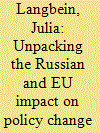

|
|
|
|
|
| Publication |
2013.
|
| Summary/Abstract |
Russia is usually considered as being obstructive to European integration in the EU's Eastern neighbourhood, while the EU is portrayed as being the key promoter of convergence with EU rules. Thus, strong economic dependence on Russia and EU active leverage should account for cross-policy variation in convergence with EU rules. By comparing convergence in Ukraine's telecommunications and food safety regulations, I show that active leverage exerted by Western European multinationals rather than by the EU accounts for divergent outcomes. Further, Russia's 'bad guy' image does not hold if we stop treating Russia as a unitary actor but distinguish between passive and active leverage exerted by Russian government policies, the Russian market and Russian multinationals investing in the Eastern neighbourhood countries on domestic policy choices.
|
|
|
|
|
|
|
|
|
|
|
|
|
|
|
|